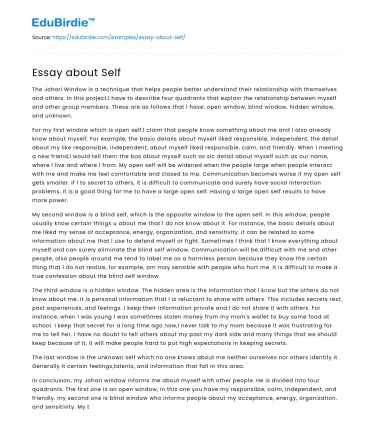Introduction
The concept of the self has been a central theme in philosophical, psychological, and sociological discourse throughout history. It is a construct that encapsulates an individual's understanding and perception of their unique identity, encompassing both introspective awareness and external social interactions. The self is not a monolithic entity but rather a complex interplay of myriad factors including personal beliefs, cultural background, and societal influences. A comprehensive exploration of the self requires delving into the cognitive processes that underpin self-awareness, the role of social contexts in shaping identity, and the philosophical debates surrounding the notion of self-identity. This essay aims to dissect these elements, providing insights into how individuals perceive themselves and are perceived by others, ultimately contributing to a deeper understanding of human identity.
Cognitive Foundations of Self-Awareness
At the heart of self-identity lies self-awareness, a cognitive process through which individuals recognize their existence as distinct entities. This capacity for introspection is considered a hallmark of human consciousness. William James, a pioneering psychologist, distinguished between the "I" and the "Me" in his seminal work, "The Principles of Psychology." The "I" refers to the subjective knower, while the "Me" encompasses the known aspects of self, including one's physical body and social roles (James, 1890). These dual aspects of self-awareness highlight the multifaceted nature of identity that is constantly evolving.
Save your time!
We can take care of your essay
- Proper editing and formatting
- Free revision, title page, and bibliography
- Flexible prices and money-back guarantee
Neuroscientific studies have shed light on the brain mechanisms underlying self-awareness. Research indicates that the prefrontal cortex, particularly the medial prefrontal cortex, plays a crucial role in self-referential thinking (Northoff et al., 2006). This region of the brain is activated when individuals engage in tasks that require them to reflect on their traits and preferences. Additionally, mirror neurons, located in the parietal and frontal lobes, facilitate the ability to empathize and understand others' perspectives, further enriching the self-concept through social interactions (Iacoboni, 2009). These cognitive underpinnings underscore the intricacies of self-awareness, which is both an innate and socially constructed phenomenon.
The Role of Social Contexts in Identity Formation
While cognitive processes provide the foundation for self-awareness, social contexts play a pivotal role in shaping one's self-identity. Sociologist George Herbert Mead emphasized the importance of societal interactions in the development of the self, proposing the "looking-glass self" theory (Cooley, 1902). According to this theory, individuals form their self-concept by internalizing others' perceptions and reactions, effectively acting as mirrors reflecting societal views. This process highlights the influence of external validation and feedback in constructing personal identity.
Real-life examples illustrate the dynamic interplay between the individual and society in identity formation. Consider the case of cultural identity, which is profoundly shaped by one's ethnic background, language, and traditions. An individual growing up in a multicultural environment may develop a hybrid identity, blending elements from various cultural influences. This phenomenon is evident in the identity struggles faced by second-generation immigrants, who often navigate the complexities of balancing their heritage with the norms of the dominant culture (Phinney, 1990). Such examples underscore the necessity of acknowledging social contexts in understanding the self, as identity is neither static nor isolated from external factors.
Philosophical Perspectives on Self-Identity
Philosophical inquiries into the nature of self-identity have generated diverse perspectives, each offering unique insights into what constitutes the self. René Descartes, a prominent figure in Western philosophy, famously posited "Cogito, ergo sum" ("I think, therefore I am"), suggesting that self-awareness is the foundation of existence (Descartes, 1641). This Cartesian dualism emphasizes the separation of mind and body, positing that self-identity is rooted in consciousness.
In contrast, existentialist philosophers such as Jean-Paul Sartre and Martin Heidegger argue that self-identity is not predetermined but is continually forged through choices and actions. Sartre's concept of "existence precedes essence" postulates that individuals define themselves through their lived experiences, implying that identity is fluid and self-determined (Sartre, 1943). These philosophical debates highlight the complexity of the self, acknowledging that identity is both an introspective reality and a social construct, constantly influenced by external interactions and internal reflections.
Conclusion
In conclusion, the self is a multifaceted construct shaped by cognitive processes, social contexts, and philosophical interpretations. Self-awareness serves as the cognitive foundation, enabling individuals to recognize their distinct existence. Social interactions further refine this identity, as societal feedback and cultural influences play a crucial role in its formation. Philosophical perspectives provide additional layers of understanding, emphasizing the dynamic and ever-evolving nature of self-identity. By examining the interplay between these elements, we gain a more comprehensive understanding of the self, recognizing it as both a personal and collective phenomenon. This exploration not only enriches our knowledge of human identity but also fosters empathy and appreciation for the diverse ways individuals perceive and construct their sense of self.






 Stuck on your essay?
Stuck on your essay?

